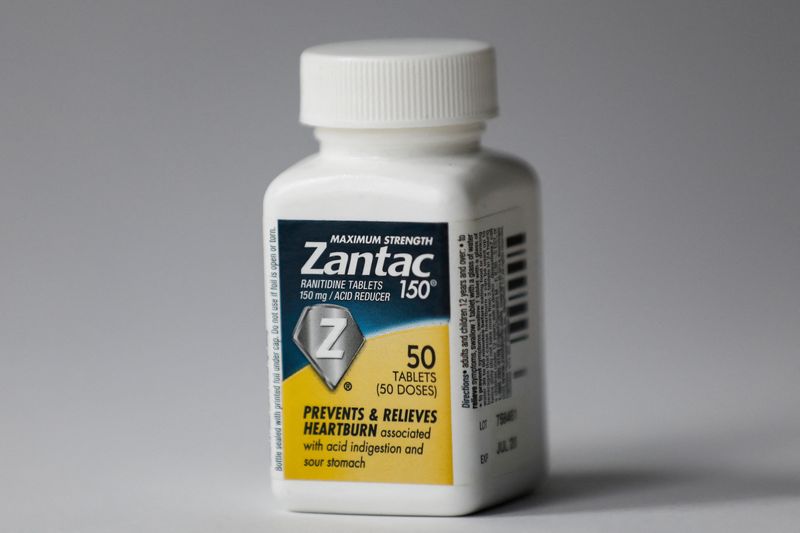By Brendan Pierson
(Reuters) -GSK, Pfizer (NYSE:PFE) and other pharmaceutical companies are urging a judge in Delaware this week to find that evidence plaintiffs' lawyers want to use in about 72,000 lawsuits claiming that the discontinued heartburn drug Zantac caused cancer is not supported by science.
If they are successful, that could end much of the long-running litigation over the drug and greatly reduce the risk of hefty damage awards or settlements, which has weighed on companies' shares in recent years.
Mark Cheffo, a lawyer for GSK, told Judge Vivian Medinilla of the Delaware Superior Court in Wilmington that the litigation was "a case of lawyers and lawsuits getting ahead of the science - way, way ahead of the science," at the start of a three-day hearing that kicked off on Monday.
No reliable studies link Zantac use to cancer, Cheffo said, a view shared by all the defendants.
Instead, he said, plaintiffs rely on a finding that Zantac's active ingredient, ranitidine, can decay into a chemical called NDMA. While NDMA may cause cancer in large amounts, he said, the levels that might appear in Zantac are similar to those found in common foods and have not been shown to cause cancer.
In 2019, some manufacturers and pharmacies halted Zantac sales after NDMA was detected in some pills. Shortly afterwards, lawsuits began piling up from people who said they developed cancer after taking Zantac. Plaintiffs said the companies knew, or should have known, that ranitidine posed a cancer risk and that they failed to warn consumers.
Brent Wisner, a lawyer for the plaintiffs, said the experts did not have to rely on evidence directly linking Zantac use to cancer. Instead, he said, they could show that the drug contains NDMA, and present evidence that NDMA can cause cancer.
That evidence could include studies of animals and of people exposed to NDMA occupationally, he said, pointing to one study of rubber workers.
"Rubber workers are humans who are exposed to NDMA," he said. "That's why they're relevant."
Medinilla is presiding over the majority of the nearly 80,000 cases still pending in the United States over Zantac, which was once the world's top-selling drug.
The drugmakers, which also include Sanofi (EPA:SASY) and Boehringer Ingelheim, notched a significant win in 2022, when another judge dismissed about 50,000 lawsuits making similar claims that had been consolidated in federal court in Florida. That judge concluded that the opinions of the plaintiffs' expert witnesses that Zantac can cause cancer were not supported by sound science. Plaintiffs are appealing that ruling.
Medinilla will be using the same legal standard to assess the expert testimony as the Florida judge, though she could reach a different conclusion, and the experts the plaintiffs lawyers have put forward are different from those excluded in the lawsuits in federal court.
Most of the Delaware lawsuits claim Zantac caused types of cancer, including prostate, breast and colorectal cancer, that plaintiffs' lawyers dropped from the federal litigation in order to focus on claims linking Zantac to other malignancies, including cancer of the bladder and stomach, that they believed were supported by stronger evidence.
If Medinilla rules plaintiffs' experts cannot testify that Zantac is capable of causing cancer, it would effectively end all the Delaware cases. The judge could also allow testimony linking the drug to some kinds of cancers, but not others, which would reduce but not eliminate the companies' potential liability.
BESTSELLER
First approved in 1983, Zantac became the world's best selling medicine in 1988 and one of the first-ever drugs to top $1 billion in annual sales. Originally marketed by a forerunner of GSK, it was later sold successively to Pfizer, Boehringer Ingelheim and finally to Sanofi.
In 2020, the U.S. Food and Drug Administration asked drugmakers to pull Zantac and its generic versions off the market after NDMA was found in samples of the drug.
Concerns about protracted legal wrangling and potential payouts that could stem from the litigation wiped almost $40 billion from the collective market value of GSK, Sanofi, Pfizer and GSK-spinoff Haleon (LON:HLN) over roughly a week in August 2022.
Lawyers for the other defendants are expected to speak during the hearing later in the week.
In addition to the cases in Delaware, the drugmakers are facing about 4,000 claims in California state court and about 2,000 in various other state courts around the country. The drugmakers have settled several individual cases in California ahead of trial.
No cases have gone to trial yet, though some are scheduled later this year in California.
